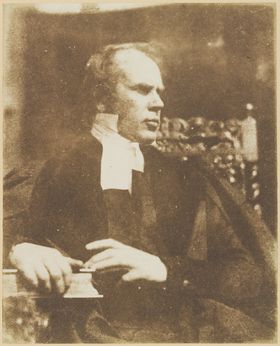David Welsh (1793-1845)
David Welsh (1793-1845) was Professor of Ecclesiastical History at Edinburgh University from 1831 until 1843, when, as one of the leaders of the newly formed Free Church of Scotland, he demitted his post and became the first Professor of Ecclesiastical History at New College.
Beginnings
Welsh, the youngest son of a sheep farmer, was born at Braefoot, Moffat, on 11 December 1843. He was educated at Moffat parish school and the Royal High School of Edinburgh, proceeding to the University of Edinburgh in 1808. There he came under the spell of the teaching of Thomas Brown (1778-1820), Professor of Moral Philosophy. He became a close friend of Brown, and would go on to publish a biography of his mentor (1825) and an edition of his lectures (1834). Welsh was licensed to preach in 1816, but continued to study (and teach) classics and mathematics. Eventually, in 1821, he became Minister of the parish of Crossmichael in Kirkcudbrightshire, where he rapidly achieved fame as a preacher. In 1827 he transferred to St. David's Church in Glasgow where, in 1830, he married Isabel Hamilton, whose brother, William Hamilton, was Provost of the city. On leaving Glasgow the following year to assume the Chair of Ecclesiastical History at Edinburgh University, he was awarded the degree of DD by Glasgow University.
University of Edinburgh
University historian Sir Alexander Grant writes that Welsh 'gave a new start to the study of Church History in Scotland, and rescued it from an almost contempt into which it had fallen'. Unlike previous incumbents, he refused all ministerial work, finding that it overstrained his delicate health. His lectures focused on the history of the church in Europe, and drew particularly on the work of German researchers. (Welsh spent several months in Germany in 1834 apprizing himself of advances in his subject.) His stimulating and well-attended lectures were eventually gathered in his Elements of Church History (1844).
Disruption
In 1843 over a third of the clergy of the Church of Scotland left the established Kirk in protest against what they perceived as state efforts to undermine its spiritual independence and integrity. On 18 May 1843, Welsh as the retiring Moderator of the Church of Scotland General Assembly, led 121 ministers and 73 elders out of the General Assembly in St. Andrew's Church, George Street, Edinburgh, to form the Free Church of Scotland. They proceeded to Tanfield Hall, Canonmills, where they formed themselves into 'the general assembly of the Free Protesting Church of Scotland', with Welsh's university colleague Thomas Chalmers (1780-1847) voted its first Moderator. As members of Edinburgh University's Faculty of Divinity were required to sign the Westminster Confession of Faith acknowledging the authority of the Church of Scotland, both Welsh and Chalmers were obliged to demit their posts. They did so on 5 June 1843, much to the regret of the Senatus Academicus.
When the Free Church proposed setting up a new institution to train its ministers, Welsh collected £21,000 in a mere two months towards the building of New College. Welsh was subsequently named as its first Professor of Ecclesiastical History and first Librarian. His efforts to build the Free Church placed enormous strain on his ailing health and he died suddenly in 1845. His rationale for seceding from the Church of Scotland are expressed in his The Limits and Extent of the Right of Private Judgement(1843). He left his extensive library to New College.
Related Pages
- Resignation of Thomas Chalmers, Professor of Divinity, 1843
- Foundation of New College, 1846
- Refusal of Charles MacDouall as Professor of Hebrew, 1847
Sources
- Sir Alexander Grant, The Story of the University of Edinburgh during its First Three Hundred Years, 2 vols (London: Longmans, Green, and Co., 1884)
- George Stronach, 'Welsh, David (1793–1845)', rev. H. C. G. Matthew (Oxford: Oxford Dictionary of National Biography, 2004)
- David F. Wright and Gary D. Badcock (eds), Disruption to Diversity: Edinburgh Divinity, 1846-1996 (Edinburgh: T. & T. Clark, 1996)
